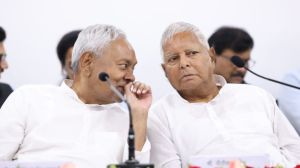Haryana DGP O P Singh’s new guidelines to reform policing culture: ‘Police officers are like electric wires… must offer light to people, not shocks’
O P Singh's communication to officers across the state emphasizes empathy, accountability, and a complete overhaul of the culture in police stations.
 DGP Singh reminded officers that police stations are funded by the public and should serve the public in return.
DGP Singh reminded officers that police stations are funded by the public and should serve the public in return. Separate visitor lounges sporting works of eminent writers, refreshments for complainants, and student volunteers to guide visitors are among the many changes that would soon feature in the police stations of Haryana as part of ‘humanising’ policing and improving public trust.
Haryana’s newly appointed Director General of Police (DGP), O P Singh, has issued a set of instructions aimed at transforming the way police personnel interact with the public. His fourth official communication to officers across the state emphasizes empathy, accountability, and a complete overhaul of the culture in police stations.
In a detailed letter addressed to Station House Officers (SHOs), Deputy Superintendents of Police (DSPs), Assistant Commissioners of Police (ACPs), Superintendents of Police (SPs), Deputy Commissioners of Poilce (DCPs), and senior officers up to the ADG level, Singh called for both symbolic and structural changes to make police stations more citizen-friendly and respectful of public concerns.
‘Government offices exist because of the people’
DGP Singh reminded officers that police stations are funded by the public and should serve the public in return. He urged officials to recognise that effective public dealing is not just a duty but an art — one that requires soft skills, sensitivity, and thoughtful office management.
To break hierarchical barriers, Singh advised officers to: downsize their desks, use the same type of chairs as visitors, avoid symbolic power markers like towels draped on chairs.
“Officials lacking people skills should be reassigned from public-facing roles”, he added.
Dedicated visitor rooms and literary touch
Taking a cue from hospitality practices, Singh recommended setting up separate visitor lounges within police stations. “Where space allows, conference rooms should be repurposed for this function. These rooms, he suggested, should include: literature by authors like Premchand, Dinkar, and Renu; appointed staff to offer refreshments; a designated officer trained in interpersonal communication to informally engage with visitors and understand their concerns”, DGP Singh added.
Adopt Metro-style visitor guidance
To streamline the experience for citizens visiting police stations, Singh proposed adopting signage and way-finding systems inspired by Metro stations. He also encouraged involving school students — particularly from DAV Police-Public Schools — as trained volunteers to welcome and guide visitors, offering both help and hospitality. This initiative, he said, would “prevent the public from feeling lost or ignored while also instilling life skills and empathy in young volunteers”.
Better listening, faster action
The DGP underlined the importance of active listening during interactions with the public. He recommended meeting complainants in conference halls (where available), maintaining eye contact, and refraining from mobile phone use during conversations. Officers should help complainants clearly articulate their issues and promptly delegate cases to relevant staff.
Three-step response system
To ensure accountability, Singh laid out a strict timeline – requiring one of three actions within a week of receiving a complaint: “file an FIR if a criminal case is warranted; log civil complaints on the Chief Minister’s CM Window via the police station computer system; if the complaint is found false, document it in the daily register and provide a copy to the complainant as a warning. Repeat offenders should face legal action.
In all cases, Singh emphasized, “officers must avoid unnecessary arguments with the public”.
No tolerance for neglect or arrogance
The DGP warned that “officers who fail to follow these guidelines would be held accountable. They will be summoned, counselled, and retrained. Those showing consistent disregard or lacking aptitude for public interaction will be moved to non-public roles”.
“There’s no sense in asking a carpenter to cook,” Singh remarked, adding that “policing is both a force and a service. Citizens seek connection, not confrontation.”
“Police officers are like electric wires – they carry power, but must offer light to the people, not shocks. And if a shock must be delivered, it should be reserved for those who exploit and harm others”, DGP Singh said.







